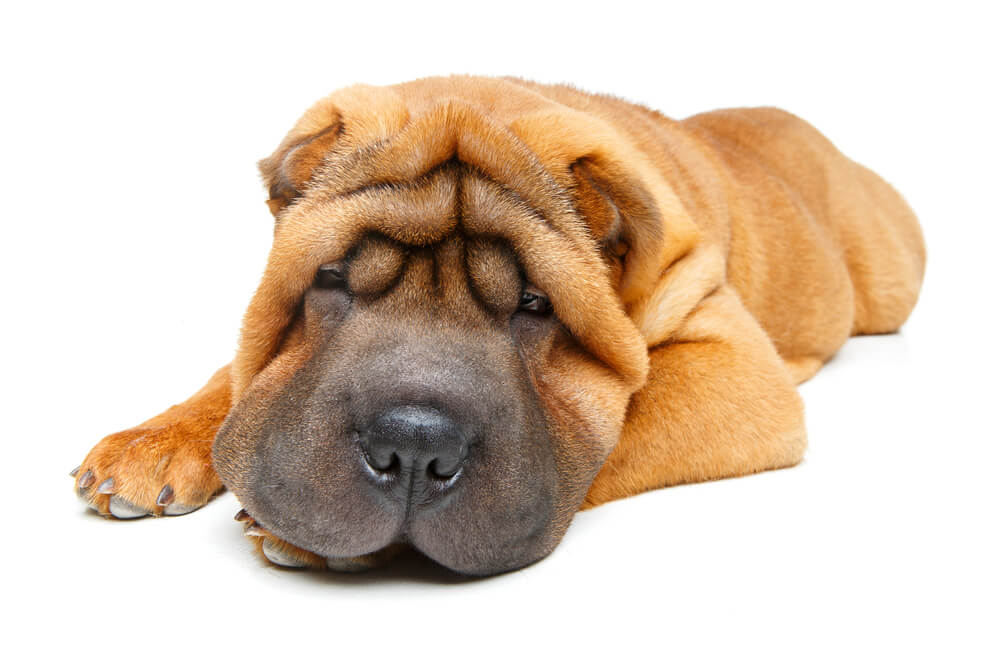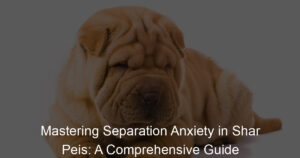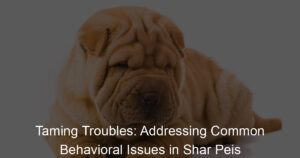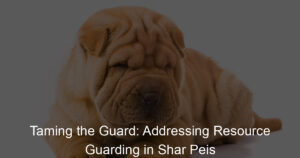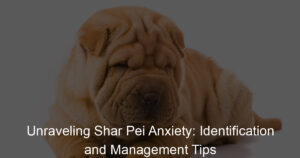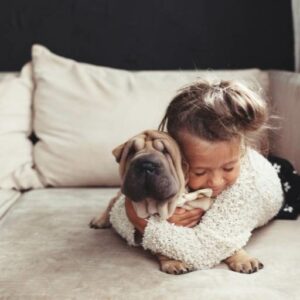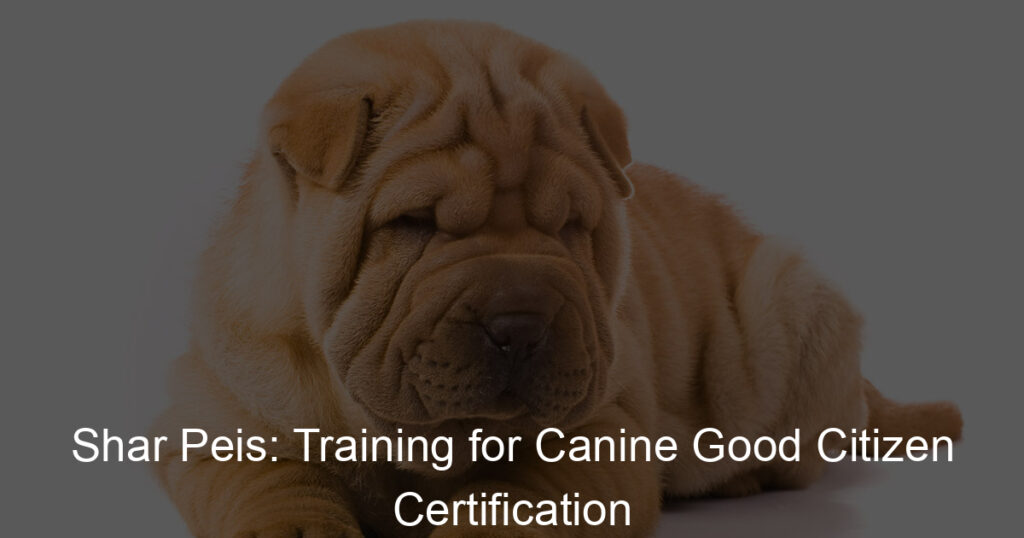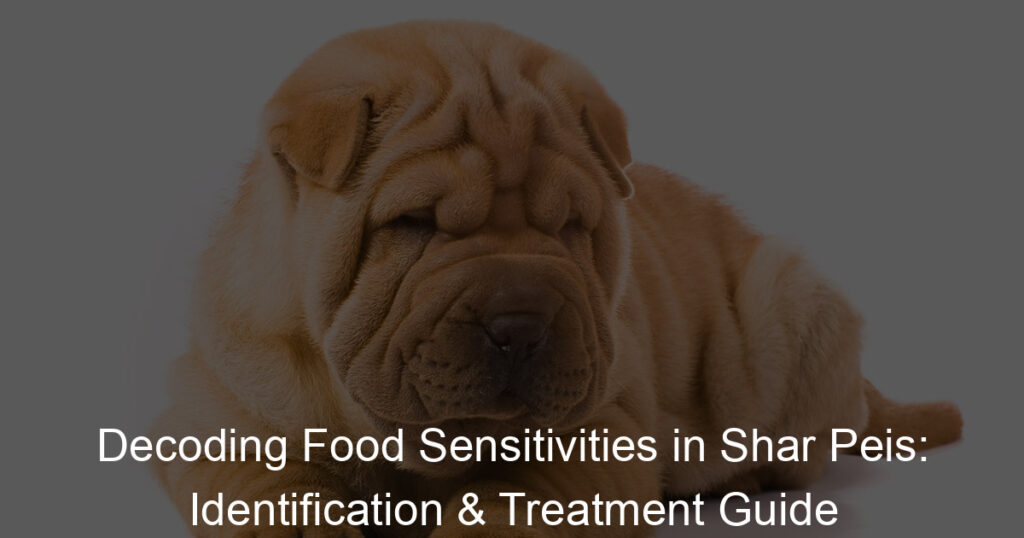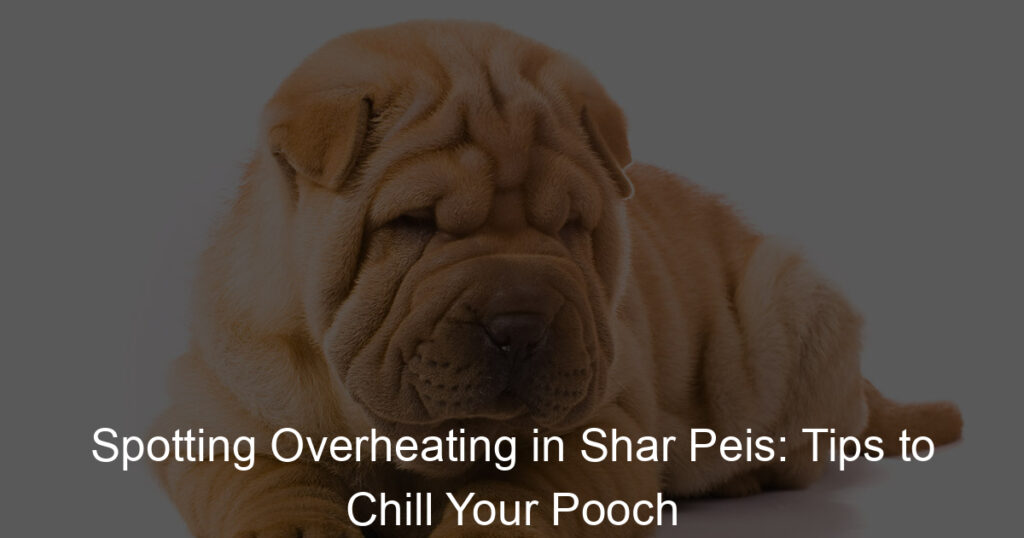Introduction: Understanding Your Restless Shar Pei
Shar Pei dogs are known for their unique appearance and loyal nature. However, like any other breed, they can sometimes display signs of restlessness, especially at night. Understanding your Shar Pei’s behavior is crucial to ensuring their health and happiness. In this post, we’ll take a closer look at typical Shar Pei behavior and how to identify signs of restlessness and night panting.
- Overview of a Shar Pei’s Typical BehaviorShar Pei dogs are known for being calm, loyal, and independent. They are usually quiet and reserved, but can also be playful and energetic when they’re in the mood. Shar Pei dogs are also very intelligent and can be a bit stubborn at times. This breed is known for its strong protective instincts, making them excellent guard dogs. However, if your Shar Pei is showing signs of restlessness, it might be a sign that something is not right.
- Identifying Signs of Restlessness and Night Panting in Shar PeiRestlessness in Shar Pei dogs can manifest in several ways. They might pace around the house, have difficulty settling down, or show signs of anxiety. Night panting is another common sign of restlessness. While it’s normal for dogs to pant after exercise or during hot weather, excessive panting at night could be a sign of discomfort or distress. If your Shar Pei is panting heavily at night and showing other signs of restlessness, it’s important to consult with a vet to rule out any potential health issues.
In the following sections, we’ll dive deeper into what night restlessness could mean for your Shar Pei, explore potential health issues, and provide practical solutions to help your furry friend get a good night’s sleep.
Shar Pei Night Restlessness: What Does It Mean?
If you’ve noticed your Shar Pei pacing, panting, or showing signs of discomfort during the night, you’re not alone. Many Shar Pei owners have experienced their furry friend’s restlessness at night. But what does it mean? Let’s dive in and find out.
Understanding the Causes of Shar Pei Panting
There are several reasons why your Shar Pei might be panting or restless at night. These can be grouped into three main categories: health issues, environmental factors, and behavioral causes.
- Health issues in Shar Pei: Shar Peis are known for certain health issues like skin problems, hip dysplasia, and Shar Pei Fever. These conditions can cause discomfort, leading to restlessness and panting. If your Shar Pei is panting excessively or showing other signs of discomfort, it’s important to consult with a vet. Learn more about Shar Pei health issues here.
- Environmental factors: Factors such as temperature, noise, and light can affect your Shar Pei’s sleep. For instance, Shar Peis are sensitive to heat, and a warm room can cause them to pant and become restless. Similarly, loud noises or bright lights can disturb their sleep.
- Behavioral causes: Sometimes, a Shar Pei’s restlessness can be due to behavioral issues. These could include separation anxiety, boredom, or lack of exercise. If your Shar Pei is well-exercised and comfortable but still restless, it might be worth consulting with a dog behaviorist.
Understanding the cause of your Shar Pei’s night restlessness is the first step towards helping them get a good night’s sleep. In the following sections, we’ll dive deeper into Shar Pei health issues and offer practical solutions to help your Shar Pei sleep better.
Shar Pei Health Issues: A Deeper Dive
Just like humans, our furry friends also have their own set of health issues. Shar Peis are no exception. Let’s take a closer look at some of the common health problems that Shar Peis often face.
Common Health Problems in Shar Pei
Here are the top three health issues that are commonly found in Shar Peis:
- Shar Pei Fever
- Skin Disorders
- Eye Conditions
Understanding these health issues can help you provide the best care for your Shar Pei. Remember, prevention is always better than cure. Regular vet visits and a healthy lifestyle can go a long way in keeping your furry friend happy and healthy.
How These Health Issues Cause Night Panting in Shar Pei
Our beloved Shar Peis can sometimes struggle with health issues that lead to night panting. Let’s explore how these health problems affect their sleep and cause excessive panting.
- Effects of health issues on a Shar Pei’s sleep
- Why these health issues cause excessive panting
Remember, every Shar Pei is unique and may react differently to health issues. Regular vet check-ups and a keen eye for changes in behavior can help ensure your Shar Pei stays happy and healthy.
Shar Pei Night Anxiety: A Hidden Issue
Just like humans, Shar Peis can also experience anxiety. It’s a hidden issue that many pet owners overlook. But, it’s crucial to understand and manage it to ensure your furry friend’s overall well-being. Let’s dive into how we can identify anxiety in Shar Peis, especially during the night.
Identifying Anxiety in Your Shar Pei
Recognizing anxiety in your Shar Pei is the first step towards managing it. Here are some signs to look out for:
- Signs of anxiety in Shar Pei: Anxiety in Shar Peis can manifest in various ways. Some common signs include excessive barking, destructive behavior, and unusual aggression. Your Shar Pei might also show signs of fear or nervousness, such as trembling, hiding, or trying to escape.
- How anxiety leads to restlessness and panting at night: Anxiety can cause restlessness in Shar Peis, making them unable to settle down and sleep. They might pace around, pant excessively, and seem on edge. This is because anxiety triggers their fight-or-flight response, keeping them alert even when it’s time to sleep.
Understanding these signs is crucial in helping your Shar Pei cope with anxiety. In the next section, we’ll explore some strategies to manage your Shar Pei’s night anxiety.
Managing Your Shar Pei’s Night Anxiety
Does your furry friend seem restless at night? Don’t worry, we’ve got some solutions to help manage your Shar Pei’s night anxiety. Here are three steps you can take:
- Creating a Safe and Comfortable Environment
Your Shar Pei’s environment plays a big role in their comfort level. Make sure their sleeping area is quiet, dark, and cozy. A comfy bed and favorite toys can help them feel secure. You might also consider using a white noise machine to drown out any scary sounds. Remember, a safe space can make a world of difference for your anxious pup.
- Training and Behavior Modification Techniques
Training can be a powerful tool to combat your Shar Pei’s night anxiety. Start by establishing a consistent bedtime routine. This can help signal to your dog that it’s time to relax and sleep. You can also use positive reinforcement techniques, like treats and praise, to reward calm behavior. Remember, patience is key. It might take some time, but with consistency, you can help your Shar Pei feel more comfortable at night.
- When to Seek Professional Help
If your Shar Pei’s night anxiety continues despite your best efforts, it might be time to seek professional help. A vet or a certified animal behaviorist can provide further guidance and treatment options. They can help identify any underlying health issues that might be contributing to your dog’s anxiety. Remember, it’s okay to ask for help. Your Shar Pei’s comfort and well-being are worth it.
Managing your Shar Pei’s night anxiety can be a challenge, but with the right approach, you can help your furry friend feel more secure and sleep better at night. Remember, every dog is unique, so what works for one might not work for another. Keep trying different strategies until you find what works best for your Shar Pei.
Shar Pei Sleep Problems: Practical Solutions
Does your Shar Pei have trouble sleeping? Don’t worry, you’re not alone. Many Shar Pei owners face the same issue. But the good news is, there are practical solutions to help improve your furry friend’s sleep quality. Let’s explore some of them!
Improving Your Shar Pei’s Sleep Quality
Improving your Shar Pei’s sleep quality isn’t as complicated as it might seem. It’s all about creating a comfortable environment and establishing a routine. Here are some tips to help you out:
- Establishing a consistent sleep routine
- Ensuring proper exercise and diet
- Creating a comfortable sleeping area
Remember, every dog is unique. What works for one Shar Pei might not work for another. It’s all about understanding your dog’s needs and making adjustments accordingly. With patience and consistency, you can help your Shar Pei overcome their sleep problems and enjoy a restful night’s sleep.
Conclusion: Ensuring a Restful Night for Your Shar Pei
It’s been a long journey, but we’ve finally reached the end of our exploration into the world of Shar Pei sleep habits. Let’s take a moment to look back at what we’ve learned and how it can help your furry friend get a good night’s sleep.
- Recap of Shar Pei restlessness causes and solutions: We’ve discovered that Shar Pei restlessness can be caused by a variety of factors, including health issues, anxiety, and environmental factors. But don’t worry, there are plenty of solutions! Regular exercise, a comfortable sleeping environment, and addressing any underlying health issues can all help your Shar Pei sleep better at night.
- Importance of understanding your Shar Pei’s behavior and health: Understanding your Shar Pei’s behavior and health is key to ensuring they get a good night’s sleep. Regular vet check-ups can help identify any potential health issues early, and observing your Shar Pei’s behavior can give you clues about what might be causing their restlessness. Remember, a well-rested Shar Pei is a happy Shar Pei!
So there you have it! With a little understanding and a lot of love, you can help your Shar Pei get the rest they need. Remember, every dog is unique, so what works for one Shar Pei might not work for another. It’s all about finding what works best for your furry friend. Sweet dreams!

